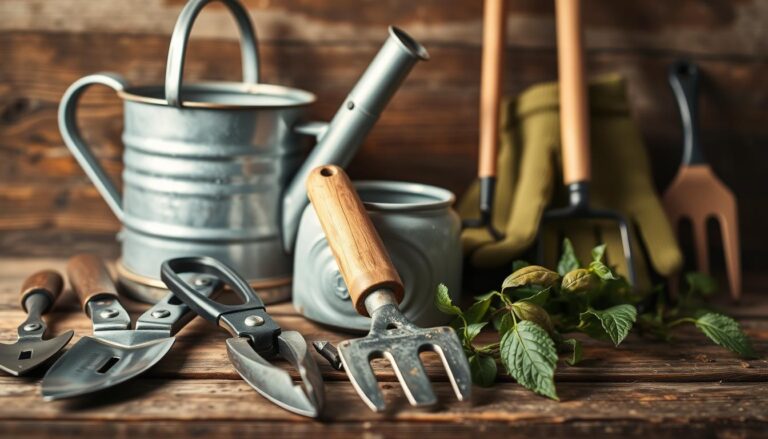Starting an organic garden is a rewarding endeavor. It gives you fresh, healthy food and helps the environment. You’ll find many organic homegrown benefits, like better health and a greener planet.
By growing your own organic garden, you control your food. This means no harmful chemicals in what you eat. The health benefits of home gardening are clear. Starting your garden connects you with others who care about health and the planet.
This guide is here to help you start your organic gardening journey. It offers key steps and tips. You’ll soon enjoy the many rewards of homegrown produce.
The Benefits of Growing Your Own Produce
Growing your own fruits and vegetables has many benefits. It improves your health, saves money, and enhances your lifestyle.
Nutritional Advantages of Fresh Homegrown Foods
Fresh, homegrown foods offer significant nutritional advantages. They are packed with nutrients and free from preservatives found in store-bought produce. For example, homegrown tomatoes have more vitamin C and lycopene than supermarket tomatoes.
| Nutrient | Homegrown Tomatoes | Supermarket Tomatoes |
|---|---|---|
| Vitamin C (mg) | 25 | 18 |
| Lycopene (mg) | 3.5 | 2.8 |
Cost Savings of Growing Your Own Food
Growing your own food can save you a lot of money. It reduces your grocery bills. For instance, a packet of organic seeds can cost $2 and yield a harvest worth $10 or more.
Here’s a simple cost comparison:
| Produce | Supermarket Price | Homegrown Cost |
|---|---|---|
| Lettuce | $3/head | $0.50/seeds |
| Carrots | $2/bunch | $1/seeds |
Self-Sufficiency Through Gardening
Gardening promotes self-sufficiency. It lets you control your food supply and live more sustainably. Growing your own food makes you less dependent on others and gives you a sense of accomplishment.
This independence is empowering. It leads to a healthier and more sustainable lifestyle.
Planning Your Organic Garden
A well-planned organic garden boosts sustainability of home gardening and cuts down on environmental harm. It involves several important steps. These steps make sure your garden is both productive and good for the planet.
Assessing Your Space and Climate
The first step is to check your garden space and know your local climate. Measure your garden area and note how much sunlight it gets. Also, understand your local weather patterns. This helps you pick the right crops for your garden, making it more environmentally sustainable.
Determining What to Grow Based on Your Region
Each region is best for different crops. Look into what grows well in your area. This helps you make smart choices about what to plant. It also means you’ll have a steady supply of fresh produce, offering great fresh fruits and vegetables benefits.
Creating a Garden Layout and Calendar
After deciding what to grow, plan your garden’s layout and calendar. This means figuring out where each crop goes, when to plant, and how to care for it. A good plan and calendar help use space well and lessen the environmental impact of home gardening.
Essential Tools and Materials for Beginners
Gardening organically is easy and affordable to start. With the right tools and materials, you can grow a healthy garden. This garden will give you fresh, healthy food.
As a beginner, having the right tools is key. “The garden is a love song, a duet between a human being and Mother Nature,” Jeff Cox said. This shows how important it is to work in harmony with nature.
Basic Gardening Tools You’ll Need
You’ll need basic tools to begin. A shovel is for digging and moving soil. A rake levels the ground and removes debris. A hoe is for weeding and preparing the soil. These tools are essential for your garden.
Organic Soil and Amendments
Organic soil and amendments are crucial for your garden’s health. Organic soil is full of nutrients and good bacteria for plants. Adding compost or manure improves soil quality. This makes your produce healthier and free from chemicals.
Budget-Friendly Equipment Options
You don’t have to spend a lot to start an organic garden. Look for sales or use second-hand tools. Many tasks can be done with little equipment. This lets you start small and grow as you learn.
By choosing the right tools and materials, you’ll enjoy many benefits. You’ll get fresh produce and a closer bond with nature.
Understanding Organic Gardening Principles
To grow a healthy organic garden, you need to know the key principles. Organic gardening aims to create a balanced ecosystem. It helps plants grow well without using harmful chemicals.
Natural Growing Methods Without Chemicals
Organic gardening focuses on natural ways to grow plants. This means:
- Using compost and organic fertilizers to enrich the soil
- Implementing crop rotation to maintain soil fertility and structure
- Employing natural pest control methods to manage pests and diseases
These methods help gardeners grow a healthy and sustainable garden. The garden will produce nutritious fruits and vegetables.
Working with Nature’s Cycles and Seasons
Organic gardening also means working with nature’s cycles and seasons. This includes:
- Planting crops at the right time to coincide with favorable weather conditions
- Observing and responding to changes in the garden ecosystem
- Using seasonal maintenance practices to ensure the garden remains healthy and productive
By working with nature, gardeners can make their garden more resilient and sustainable.
Learning and using these organic gardening principles can make gardening more sustainable and environmentally friendly. It helps with the health benefits of home gardening and the sustainability of home gardening.
Preparing Your Garden Bed
A well-prepared garden bed is key to a successful garden. It boosts the benefits of growing your own produce. Whether you have a big backyard or a small balcony, good soil preparation is crucial. It helps your plants grow strong and supports your goal of self-sufficiency through gardening.
Container Gardens for Limited Spaces
Container gardens are great for small spaces. You can put them on balconies, patios, or indoors if they get enough light. Make sure containers have holes for water to drain.
In-Ground Garden Preparation
Starting an in-ground garden needs a few steps. First, do a soil test to check its pH and nutrients. Then, add organic matter like compost or manure based on the test. This makes the soil better for plants and supports healthy microbes.
Building Simple Raised Beds
Raised beds are good for better drainage and warmer soil. Use untreated wood, brick, or composite to build them. Make them 6-8 inches deep for good root growth. Fill them with a mix of topsoil, compost, and other organic stuff for a fertile spot.
| Garden Type | Key Features | Benefits |
|---|---|---|
| Container Gardens | Flexibility in placement, good drainage | Ideal for limited spaces, easy to manage |
| In-Ground Gardens | Soil testing and amendment | Improves soil fertility and structure |
| Raised Beds | Better drainage, warmer soil | Enhanced root growth, improved accessibility |
Choosing the right method is important. The goal is to make a place where plants can grow well. By preparing your garden bed well, you’ll get a lot of fresh produce and enjoy the homegrown produce advantages.
Selecting and Starting Seeds
Growing your own organic produce begins with choosing the right seeds. The right seeds are the foundation for a healthy garden. They help you save money and enjoy the cost savings of growing your own food and the organic homegrown benefits.
Choosing Organic Seeds and Seedlings
Choosing organic seeds is key. Organic seeds are made without synthetic chemicals. This keeps your garden chemical-free and healthy.
It also means you get fresh fruits and vegetables benefits. You and your family will enjoy nutritious food.
Indoor Seed Starting Methods
Starting seeds indoors gives them a head start. Use seed trays or pots with good potting mix. Keep the soil moist but not too wet.
Make sure they get enough light. Indoor starting lets you control the growing conditions better. This leads to healthier seedlings.
Direct Sowing Guidelines and Timing
Direct sowing is another good way to start seeds. Plant them straight into the garden bed. Timing is everything, depending on the plant and your local weather.
Knowing when to sow is crucial for success. By picking the right method, you’ll have a great harvest. Enjoy the journey and the fruits of your labor.
Natural Pest Management Strategies
Keeping an organic garden healthy means finding natural ways to fight pests. It’s key for the garden’s health and the planet. Natural methods help gardeners protect their crops while keeping the garden healthy.
Nature offers many tools for organic pest control. Companion planting is one, where certain plants keep pests away. For example, marigolds can keep nematodes from tomatoes.
Companion Planting for Pest Control
Companion planting is a simple way to fight pests. By picking the right plants together, gardeners can avoid chemicals. Basil, for instance, keeps aphids away and makes veggies taste better.
Other examples include garlic near roses to fight aphids and nasturtiums to repel many pests. This method also boosts garden diversity.
Attracting Beneficial Insects to Your Garden
Another strategy is to attract good bugs. Ladybugs and lacewings eat pests, keeping them in check.
To draw these bugs, plant flowers like dill and cosmos. They give nectar and pollen. This is a green way to manage pests.
Homemade Organic Pest Control Solutions
For big pest problems, try homemade solutions. Sprays from garlic or hot peppers can fight many pests.
These homemade sprays save money and are better for the environment. They let gardeners avoid harmful chemicals.
By using companion planting, attracting beneficial insects, and making homemade sprays, gardeners can keep their gardens healthy. This approach supports sustainable gardening and keeps the garden thriving.
Sustainable Watering and Maintenance
To keep your organic garden healthy, it’s important to use sustainable watering and maintenance methods. These strategies help save water and make your garden stronger and more resilient.
Water Conservation Techniques
Watering wisely is crucial for a sustainable garden. Drip irrigation sends water straight to the roots, cutting down on evaporation and runoff. It’s a key way to save water and is essential for gardeners who want to be water-efficient.
Rain barrels are also great for collecting rainwater. They help reduce the need for city water and give you a natural, chemical-free water source for your garden.
Mulching Benefits and Methods
Mulching is a simple yet powerful practice. It involves covering the soil with organic materials like wood chips or straw. This keeps the soil moist, stops weeds, and controls soil temperature, making it better for plants to grow.
There are many mulching options, including organic and inorganic ones. Organic mulches, like compost or manure, improve soil health as they break down. They also make your garden look nicer.
Seasonal Maintenance Calendar
To keep your organic garden thriving all year, you need a seasonal maintenance calendar. This helps you plan and do tasks like pruning, composting, and pest control at the right times.
By staying on top of these tasks, you can avoid problems and keep your garden healthy and productive. This approach not only boosts self-sufficiency through gardening but also increases the benefits of growing your own produce.
Conclusion: Harvesting and Enjoying Your Organic Bounty
The moment you’ve been waiting for has finally arrived – it’s time to harvest and enjoy the fruits of your labor. Growing your own organic garden is a rewarding experience. It provides numerous benefits, including the advantages of homegrown produce.
Fresh fruits and vegetables from your garden are not only more flavorful. They also offer better nutritional value compared to store-bought alternatives. This highlights the fresh fruits and vegetables benefits.
By following this guide, you’ve taken the first step towards a healthier lifestyle. You’re reaping the health benefits of home gardening. As you savor the taste of your homegrown produce, remember that the journey of gardening is just as important as the harvest.
The process of nurturing your plants, watching them grow, and enjoying the fruits of your labor is fulfilling. It connects you with nature.
As you continue to tend to your garden, you’ll discover the joy of self-sufficiency. You’ll find satisfaction in eating food that’s been grown with care and dedication. So, take pride in your accomplishments, and enjoy the bounty of your organic garden – a true reward for your hard work and dedication.
FAQ
What are the main benefits of growing my own organic produce?
How do I choose the right plants for my organic garden?
What are some essential tools and materials needed for starting an organic garden?
How can I manage pests in my organic garden without using chemicals?
What are some effective water conservation techniques for my organic garden?
How often should I maintain my organic garden, and what tasks should I perform seasonally?
Can I start an organic garden in a limited space?
What are the advantages of using raised beds in my organic garden?

Sortemdia nasceu com o propósito de trazer alegria e oportunidades para todos por meio de sorteios gratuitos de prêmios incríveis. O site tem como missão oferecer experiências acessíveis, divertidas e justas para quem deseja concorrer a produtos, serviços e brindes sem pagar nada por isso. Acreditamos que a sorte pode bater à porta de qualquer pessoa — e no Sortemdia, ela pode chegar com apenas um clique.



